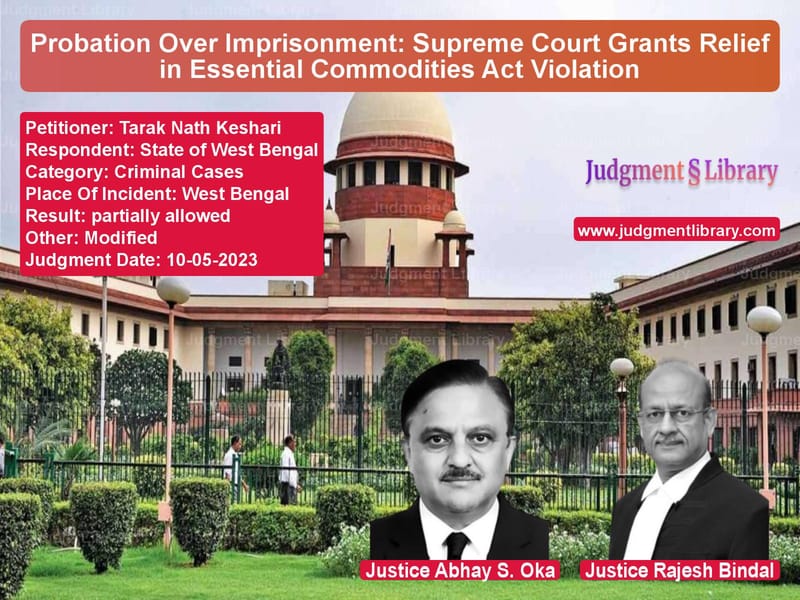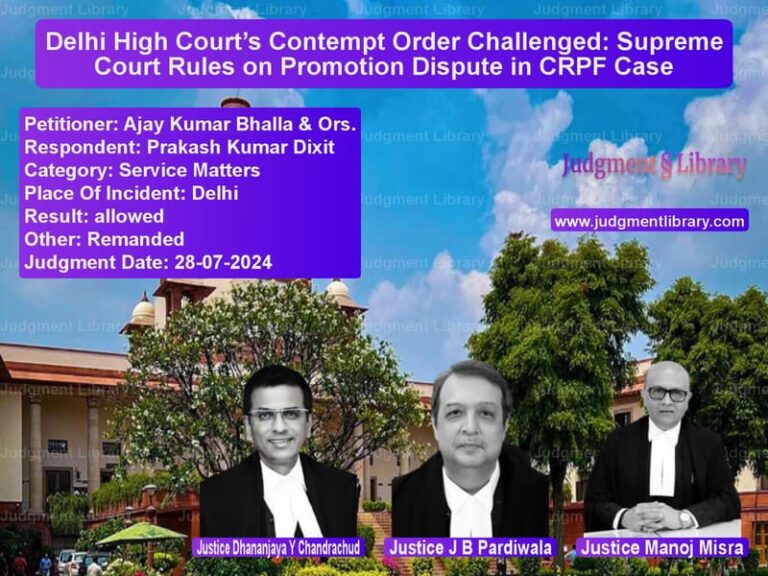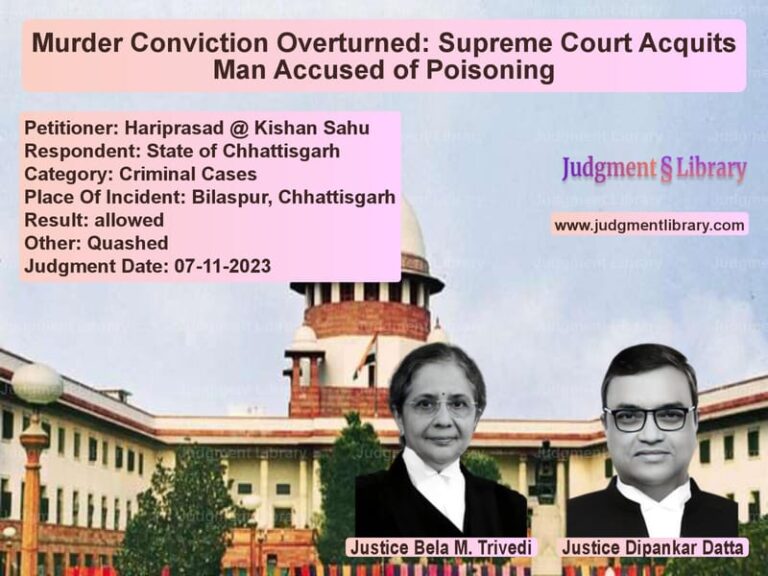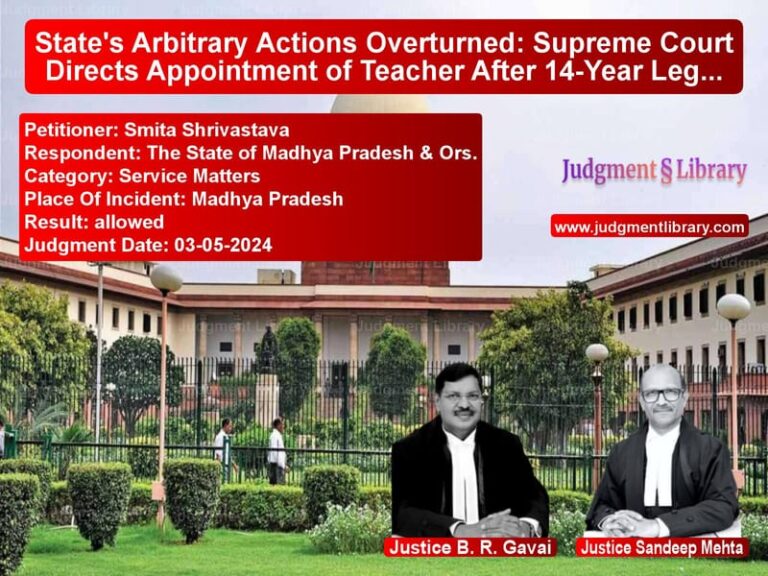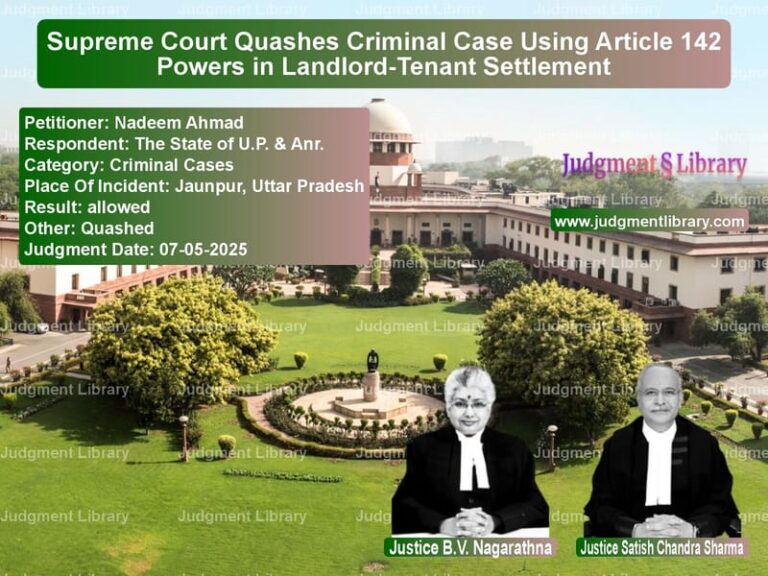Probation Over Imprisonment: Supreme Court Grants Relief in Essential Commodities Act Violation
The Supreme Court of India, in the case of Tarak Nath Keshari vs. State of West Bengal, addressed a crucial legal issue concerning sentencing under the Essential Commodities Act, 1955 (EC Act). The Court ruled that despite the prescribed minimum punishment under the Act, a convict can be granted probation under the Probation of Offenders Act, 1958. The judgment provides significant relief for first-time offenders in cases involving minor violations of the EC Act.
Background of the Case
The case originated from an inspection conducted at the grocery shop of the appellant, Tarak Nath Keshari, on August 20, 1985. During the inspection, it was found that the stock of mustard oil and vegetable oil in his shop exceeded the permissible limit under the West Bengal Pulses, Edible Oil (Dealers Licensing) Order, 1978. The appellant was charged under Section 7(1)(a)(ii) of the EC Act for violating the licensing order.
The trial court convicted the appellant and sentenced him to six months of rigorous imprisonment and a fine of Rs. 500. The proceeds from the sale of the seized oil were forfeited to the State. The appellant appealed to the Calcutta High Court, which upheld the conviction but reduced the sentence to three months of rigorous imprisonment while maintaining the fine. Dissatisfied with the decision, the appellant approached the Supreme Court.
Legal Issues Considered
The Supreme Court examined the following key legal questions:
- Whether the sentence prescribed under Section 7(1)(a)(ii) of the EC Act is mandatory or if it allows discretion for awarding probation under the Probation of Offenders Act, 1958.
- Whether the long delay of over 37 years since the alleged offence should be considered a mitigating factor.
- Whether the appellant’s conduct, lack of prior criminal record, and compliance during trial justify releasing him on probation instead of imprisonment.
Arguments by the Appellant
The appellant, represented by his counsel, argued that:
- The offence was committed in 1985, and more than three decades had passed since then.
- During this period, the appellant remained on bail and complied with all legal procedures.
- He had no previous criminal record and had not committed any further violations.
- The Probation of Offenders Act, 1958, allows for probation even if the EC Act prescribes a minimum sentence.
- Imposing imprisonment at this stage would serve no meaningful purpose and would be unduly harsh.
Arguments by the State
The State, represented by counsel, countered that:
- The lower courts had already exercised leniency by reducing the sentence.
- The EC Act prescribes a minimum punishment of three months for such offences.
- Granting probation would undermine the deterrent effect of the law.
- The appellant was found guilty beyond reasonable doubt, and his conviction should not be interfered with.
Supreme Court’s Observations
Applicability of Probation Despite Minimum Sentence in EC Act
The Supreme Court examined Section 7(1)(a)(ii) of the EC Act, which mandates a minimum sentence of three months but also includes a proviso allowing courts to impose a lesser sentence for ‘adequate and special reasons.’ The Court ruled that this provision does not override the applicability of the Probation of Offenders Act, 1958.
Benefit of Probation Due to Delay in Proceedings
The Court acknowledged that 37 years had elapsed since the offence was committed. It noted that the appellant had complied with all bail conditions and had not engaged in any further criminal activity. The Court held that sending him to prison at this stage would not serve the purpose of justice.
Probation of Offenders Act, 1958, Overrides Minimum Sentence
The Court relied on Section 4 of the Probation of Offenders Act, 1958, which provides courts with the discretion to release offenders on probation instead of imposing a sentence. It cited the case of Lakhvir Singh vs. State of Punjab (2021), where a similar approach was taken.
Final Judgment
The Supreme Court ruled that:
- The conviction of the appellant was upheld.
- However, the sentence of imprisonment was set aside.
- The appellant was directed to be released on probation under Section 4 of the Probation of Offenders Act, 1958.
- He was required to enter into a bond with two sureties, ensuring that he would maintain peace and good behavior for the remaining part of his sentence.
Key Takeaways
- Courts Can Use Probation in EC Act Cases: Despite the minimum sentence prescribed under the EC Act, courts have the discretion to release offenders on probation.
- Long Delays in Justice System Considered a Mitigating Factor: The ruling highlights that prolonged delays in legal proceedings can be a ground for granting probation.
- Judicial Precedents Support Probation for First-Time Offenders: The decision aligns with past Supreme Court rulings emphasizing rehabilitation over imprisonment.
- Strict Compliance with Probation Conditions: The ruling ensures that offenders granted probation must comply with conditions to maintain good behavior.
Conclusion
The Supreme Court’s judgment in Tarak Nath Keshari vs. State of West Bengal reinforces the principle that courts should consider probation as an alternative to imprisonment in minor offences under the EC Act, especially when significant time has passed since the offence. The ruling provides clarity on sentencing discretion and underscores the judiciary’s role in balancing legal deterrence with fairness.
Petitioner Name: Tarak Nath Keshari.Respondent Name: State of West Bengal.Judgment By: Justice Abhay S. Oka, Justice Rajesh Bindal.Place Of Incident: West Bengal.Judgment Date: 10-05-2023.
Don’t miss out on the full details! Download the complete judgment in PDF format below and gain valuable insights instantly!
Download Judgment: tarak-nath-keshari-vs-state-of-west-bengal-supreme-court-of-india-judgment-dated-10-05-2023.pdf
Directly Download Judgment: Directly download this Judgment
See all petitions in Bail and Anticipatory Bail
See all petitions in Fraud and Forgery
See all petitions in Custodial Deaths and Police Misconduct
See all petitions in Judgment by Abhay S. Oka
See all petitions in Judgment by Rajesh Bindal
See all petitions in partially allowed
See all petitions in Modified
See all petitions in supreme court of India judgments May 2023
See all petitions in 2023 judgments
See all posts in Criminal Cases Category
See all allowed petitions in Criminal Cases Category
See all Dismissed petitions in Criminal Cases Category
See all partially allowed petitions in Criminal Cases Category

